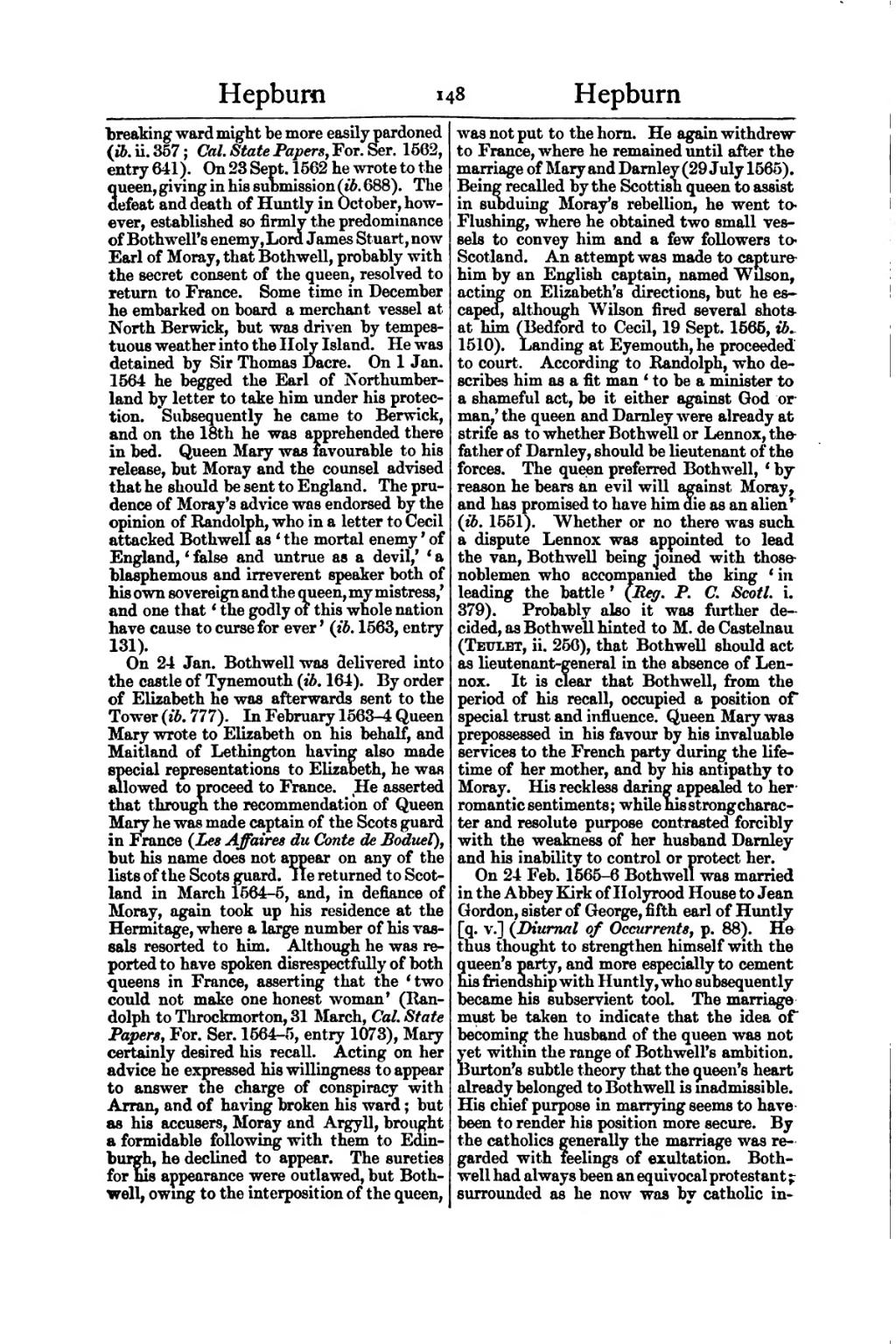breaking ward might be more easily pardoned (ib. ii. 357; Cal. State Papers, For. Ser. 1562, entry 641). On 23 Sept. 1562 he wrote to the queen, giving in his submission (ib. 688). The defeat and death of Huntly in October, however, established so firmly the predominance of Bothwell's enemy, Lord James Stuart, now Earl of Moray, that Bothwell, probably with the secret consent of the queen, resolved to return to France. Some time in December he embarked on board a merchant vessel at North Berwick, but was driven by tempestuous weather into the Holy Island. He was detained by Sir Thomas Dacre. On 1 Jan. 1564 he begged the Earl of Northumberland by letter to take him under his protection. Subsequently he came to Berwick, and on the 18th he was apprehended there in bed. Queen Mary was favourable to his release, but Moray and the counsel advised that he should be sent to England. The prudence of Moray's advice was endorsed by the opinion of Randolph, who in a letter to Cecil attacked Bothwell as ‘the mortal enemy’ of England, ‘false and untrue as a devil,’ ‘a blasphemous and irreverent speaker both of his own sovereign and the queen, my mistress,’ and one that ‘the godly of this whole nation have cause to curse for ever’ (ib. 1563, entry 131).
On 24 Jan. Bothwell was delivered into the castle of Tynemouth (ib. 164). By order of Elizabeth he was afterwards sent to the Tower (ib. 777). In February 1563–4 Queen Mary wrote to Elizabeth on his behalf, and Maitland of Lethington having also made special representations to Elizabeth, he was allowed to proceed to France. He asserted that through the recommendation of Queen Mary he was made captain of the Scots guard in France (Les Affaires du Conte de Boduel), but his name does not appear on any of the lists of the Scots guard. He returned to Scotland in March 1564–5, and, in defiance of Moray, again took up his residence at the Hermitage, where a large number of his vassals resorted to him. Although he was reported to have spoken disrespectfully of both queens in France, asserting that the ‘two could not make one honest woman’ (Randolph to Throckmorton, 31 March, Cal. State Papers, For. Ser. 1564–5, entry 1073), Mary certainly desired his recall. Acting on her advice he expressed his willingness to appear to answer the charge of conspiracy with Arran, and of having broken his ward; but as his accusers, Moray and Argyll, brought a formidable following with them to Edinburgh, he declined to appear. The sureties for his appearance were outlawed, but Bothwell, owing to the interposition of the queen, was not put to the horn. He again withdrew to France, where he remained until after the marriage of Mary and Darnley (29 July 1565). Being recalled by the Scottish queen to assist in subduing Moray's rebellion, he went to Flushing, where he obtained two small vessels to convey him and a few followers to Scotland. An attempt was made to capture him by an English captain, named Wilson, acting on Elizabeth's directions, but he escaped, although Wilson fired several shots at him (Bedford to Cecil, 19 Sept. 1565, ib. 1510). Landing at Eyemouth, he proceeded to court. According to Randolph, who describes him as a fit man ‘to be a minister to a shameful act, be it either against God or man,’ the queen and Darnley were already at strife as to whether Bothwell or Lennox, the father of Darnley, should be lieutenant of the forces. The queen preferred Bothwell, ‘by reason he bears an evil will against Moray, and has promised to have him die as an alien’ (ib. 1551). Whether or no there was such a dispute Lennox was appointed to lead the van, Bothwell being joined with those noblemen who accompanied the king ‘in leading the battle’ (Reg. P. C. Scotl. i. 379). Probably also it was further decided, as Bothwell hinted to M. de Castelnau (Teulet, ii. 256), that Bothwell should act as lieutenant-general in the absence of Lennox. It is clear that Bothwell, from the period of his recall, occupied a position of special trust and influence. Queen Mary was prepossessed in his favour by his invaluable services to the French party during the lifetime of her mother, and by his antipathy to Moray. His reckless daring appealed to her romantic sentiments; while his strong character and resolute purpose contrasted forcibly with the weakness of her husband Darnley and his inability to control or protect her.
On 24 Feb. 1565–6 Bothwell was married in the Abbey Kirk of Holyrood House to Jean Gordon, sister of George, fifth earl of Huntly [q. v.] (Diurnal of Occurrents, p. 88). He thus thought to strengthen himself with the queen's party, and more especially to cement his friendship with Huntly, who subsequently became his subservient tool. The marriage must be taken to indicate that the idea of becoming the husband of the queen was not yet within the range of Bothwell's ambition. Burton's subtle theory that the queen's heart already belonged to Bothwell is inadmissible. His chief purpose in marrying seems to have been to render his position more secure. By the catholics generally the marriage was regarded with feelings of exultation. Bothwell had always been an equivocal protestant; surrounded as he now was by catholic in-
